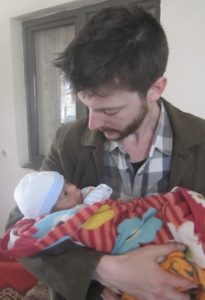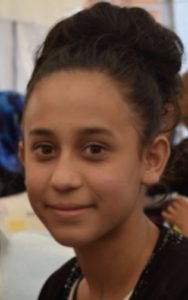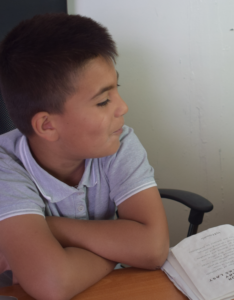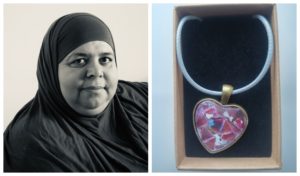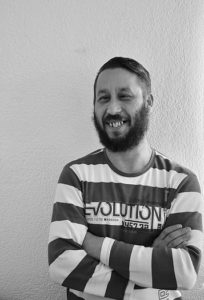4. Arlinda’s story: the beauty of second chances
Arlinda lives in Neighbourhood 29 of Fushe Kosove. I met her at The Ideas Partnership’s centre in the community when Arlinda came to offer some of her crochet work for me to sell in the UK. I told her honestly that I didn’t think these designs would find a market and that the best chances I had to sell things were at the talks I gave about my books.
‘For example,’ I said, ‘later this month I’ll be going to England to give a talk about my book on beekeeping. It will be hard to make a link to your crocheted goods to sell to the people who attend that talk.’ I was sorry not to be able to help her more, and she quietly went away.
A week later she was back, giving it a second go, with a selection of fantastic bee-themed crafts she’d found patterns for online – baby booties in the yellow and black stripes of a honeybee, and little yellow hats with black antennae!
That attitude, of creativity and innovation, would mark Arlinda out in any community. But it’s not the result of any formal education – she’s never been to school. Instead, the basic skills she has are the result of ‘second chance’ classes that this mother of five children decided to take at The Ideas Partnership’s centre along with 40 other women from her community.
Their teacher, Mirlinda Gerguri, says, ‘I noticed Arlinda right away because of her interest and the constant commitment she displayed. I can see that deep within her she has a fighting spirit of ambition, together with being so sweet with her family and other people. She would always say “I’m doing all I can to make sure that the education I’ve not managed to achieve for myself can be achieved for my children”. She gives me hope for the future.’
With all that Arlinda has learned at these classes, she has taken her handcrafts to a new level as the proud owner of a business she registered herself. Recently she also applied for a business grant which has enabled her to start a new product line drawing inspiration from the rubbish-picking activities which are a major source of income in her community. She says
‘I saw how many old music CDs were in the rubbish and I found some examples online of how these CDs could make beautiful mosaic jewellery. With my grant I’ve been able to make the first necklace pendants from upcycled CDs, giving a second chance to the things that people throw away. Through The Ideas Partnership I’ve even been able to get the necklaces sold in a shop in England.’
‘What I’m most proud of is that now I don’t just rely on my husband – I can earn for our family. My children are impressed by the work I’ve done. And now I’m dreaming of building a better house for my children – we’re overcrowded where we live now and it’s damp.’
The jewellery that Arlinda makes is a beautiful image of The Ideas Partnership’s philosophy of second chances.
Arlinda’s necklaces are available for £10 in the UK/ 10 euro in Kosovo. Email elizabethgowing@hotmail.com to place an order
5. Hysni’s story: ‘when other people love you then you start to love yourselves’
When I wrote the story of Hateme, The Rubbish-Picker’s Wife: an unlikely friendship in Kosovo, some people commented that it was as much the story of Hysni as of Hateme. And both those people’s stories have of course developed after the narrative of the book came to an end. So here’s the story of TIP’s first full-time employee Hysni – and why it now takes him twice as long to get home.
Hysni and I at the launch of ‘The Rubbish-Picker’s Wife: an unlikely friendship in Kosovo’
When we started working in Fushe Kosove, Hysni was unemployed, finding casual labour like loading up sacks of sugar at the station, pulling up potatoes, doing shifts in a shampoo factory and going out to look for recyclable material in the rubbish bins. He had six children and none of them was in school. He himself had been to school but when Albanian language education was shut down in the 1990s he had stopped at ninth grade. In all this his family was typical of many in the community.
The Ideas Partnership (TIP) advertised a position for a mediator from the community with funding from Austrian Development Co-operation, and Hysni applied and got the job. And now? I ask him, ‘What’s changed?’ and he smiles with pride.
He starts with education. ‘Thanks to TIP I finished school and then I went to evening classes to get my high school diploma which TIP’s private donors paid for. Then I registered at university.
‘I saw how TIP valued education, and I realised I needed to pay more attention to it. And now with my education I’ve tried to be an example for others. I see the change not just in me – there’s been an improvement across the community thanks to the work we’ve done. There’s been a change in mentality. When we started registering children for school eight years ago we had to go to each house and offer transport to take the parents with their children to the school to register, and we still didn’t always have success. Now it’s parents who come to us asking about how to register and once we’ve explained it to them they go off and register their children themselves, like it should be. Though there are still some children who aren’t registered, so we still have work to do.’
And how have these experiences changed him?
‘In the past people didn’t really consider me much. I did my work, I went home, I went to sleep, and then I went back to finding work. The moment I got the position at TIP, people in the community started contacting me. My faith tells me that you shouldn’t have a bad relationship with anyone and I feel so proud that I’ve been able to help all these people. Now I’m a member of the municipal assembly too. Sometimes it takes me 20 or 30 minutes to get home because of the questions I have from people who stop me in the street asking for our help.’
But it’s not just the relationships in his own community that have changed for Hysni. ‘I’ve learned how to present to VIPs. I remember the first conference that you and I went to. The Minister of Education was there and all kinds of other people, and I was the only person not in a suit. You said to me “Even though you’ve not got a tie, you know more than all these others, because you work in the field.” I began to believe in myself. I learned to say ‘‘I like to hear someone, but I hope that when I speak I’ll be listened to as well.”
‘We’ve had volunteers, people like you, who’ve come to Kosovo from abroad, and I’ve learned how to talk to people who are different from me, I’ve come across different mentalities, seen other ways that people behave, and seen how people care. And when other people love you then you start to love yourselves. Now I try to use that as my approach with people in my own community.’
